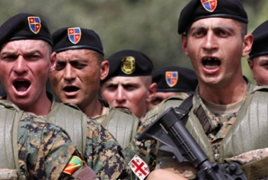ICC launches probe into alleged war crimes in S. Ossetia conflict January 29, 2016 - 10:18 AMT PanARMENIAN.Net - Judges at the international criminal court have given the green light for a new inquiry into allegations of war crimes during a brief but bloody 2008 war between Russia and Georgia, the Guardian reports. It will be the first inquiry by the world’s only permanent war crimes court into allegations of abuses by Russia, and also the first to examine a conflict outside of Africa. In October last year, the ICC prosecutor Fatou Bensouda formally requested to be allowed to open a full investigation into the 2008 war in South Ossetia. She told judges that preliminary findings suggested evidence of alleged war crimes and crimes against humanity. A panel of three judges agreed to the request, concluding that “there is a reasonable basis to believe that crimes within the ICC’s jurisdiction have been committed in the situation in Georgia”. They said such charges included “crimes against humanity, such as murder, forcible transfer of population and persecution, and war crimes, such as attacks against the civilian population, willful killing”. On the night of 7-8 August 2008, Georgia’s then president, Mikhail Saakashvili, launched an offensive to reclaim the region of South Ossetia. But he was caught by surprise when Moscow launched a swift counter-offensive and Russian forces swept into Georgia. After winning the brief war, Russia recognized South Ossetia – along with another breakaway Georgian region, Abkhazia – as independent states. Together the two regions comprise about 20% of Georgian territory. Azerbaijani President Ilham Aliyev arrived in Moscow on April 22 to hold talks with Russian counterpart Vladimir Putin. Authorities said a total of 192 Azerbaijani troops were killed and 511 were wounded during Azerbaijan’s offensive. In 2023, the Azerbaijani government will increase the country’s defense budget by more than 1.1 billion manats ($650 million). The bill, published on Monday, is designed to "eliminate the shortcomings of an unreasonably broad interpretation of the key concept of "compatriot". Partner news |